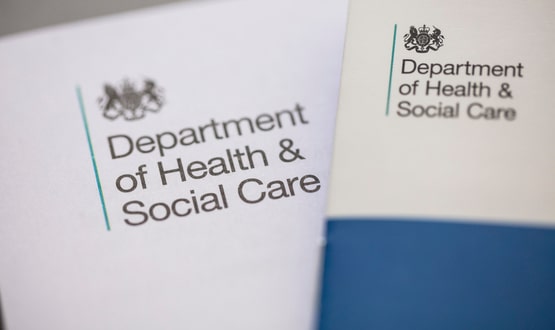NHS overhaul: ‘Real opportunity’ for digital leaders to shape the future
- 12 February 2021

There’s a “real opportunity” for digital clinical leaders to shape the future of joined up care under government plans to overhaul the NHS, the chair of Digital Health’s CCIO Network has said.
James Reed called on digital leaders to “be active” while the proposals are unfolding are there’s opportunity to shape how they work in the NHS.
It comes following the publication of a white paper for health and care which would put integrated care systems (ICSs) on a statutory footing with all areas in England required to be covered.
The plan aims to enable the NHS to use technology in a modern way to support staff and patient care, including improving quality and availability of data, according to a Department of Health and Social Care statement.
“There’s a real opportunity for what digital clinical leadership means in this new world,” Reed told Digital Health News.
“We’ve got an established cadre of clinical leaders in healthcare providers, most places have a CCIO or that kind of role, but the question is ‘what does digital leadership mean at a regional level?’.
“We should be looking to have clinical leaders and CCIOs setting the agendas and looking outside the organisation to determine how the digital delivery of care works across the economy. That’s the question we’ve got to answer now.”
For ICSs to be successful in implementing joined up care, a chief clinical information officer (CCIO) and finance officer that is able to act independently from parliament should be put in place, one Digital Health Network’s member suggested.
Adrian Byrne, chair of Digital Health’s CIO Network, called for clarity on whether ICSs would be responsible for putting IT plans in place or mandating a minimum spend on technology.
He said the plans provide an opportunity to “get it right” but “a lot more integration” is needed.
“Working more across a regional community in an ICS is probably where we need to be in terms of getting better use of resources,” he told Digital Health News.
“It does require a lot more integration between organisations in order to achieve it, so I think it’s going to highlight the work of standards and of people.”
He added it could go some way to breaking down barriers between organisations, but a competitive spirit would “undoubtably” remain.
“When you’re in an ultra-competitive situation you tend to put up barriers whereas the future of the service needs to be much more about what we call ‘hospitals without walls’ – so no silo working,” Byrne said.
“We would hope that this contributes to a more collegiate approach. Whether that transpires or not is another matter because we’ve heard it all before about reduction in bureaucracy.”
‘Genuine improvement available’
One Network member, who wanted to remain anonymous, told Digital Health News that reorganisations are “expensive, disruptive and distracting” but that the benefits of shared care and shared information needed to be explored.
“I can’t say whether a national reorganisation run by a minister with political pressures on them is a good way of achieving those benefits,” they added.
“I’d want real proof that you couldn’t get that integration of primary care, secondary care and social care where appropriate by evolutionary means before I went into a national reorganisation.”
They said there is “genuine improvement available” through closer working of primary and secondary care but warned the decision to leave out social care would not achieve true joined up care.
Busting bureaucracy
The government’s proposals follow health secretary Matt Hancock’s ‘bureaucracy-busting mission’, which aims to improve the use of data within the NHS and would see the health service capitalise on “good practice” responses during Covid-19.
They would also see legislative changes to reduce bureaucracy around procurement and data sharing.
Under the plans commissioners would no longer be required to put contracts out to tender and instead there would be a new policy which gives the NHS and local authorities greater flexibility over who would provide healthcare services.
“The concept of being able to just operate within the NHS and not have to tender for services which you could perfectly easily do in-house is potentially quite a load off the service,” Byrne told Digital Health News.
“In theory I welcome the approach, but in practice will it do what it says on the tin?”
Reed added that having more flexibility over procurement could give organisations more choice.
“There’s obvious reasons sometimes as to why a particular supplier is the one you want, and you do run the risk that if you run a full procurement exercise you can trip yourself up,” he said.
“I’ve seen suppliers perform unexpectedly badly in one area of procurement that then rules them out and you know that isn’t quite right, but you’re stuck because the rules are what they are.”
A Network member suggested the rule changes apply to the procurement of services rather than products, but said more information is needed on what the government is proposing.
“We don’t have a good track record of big systems being done to national requirements,” they said.
We are the hosts of Digital Health Rewired 2021, the must-attend virtual festival celebrating the best of digital health and care, taking place across 15-19 March 2021. Get a flavour of Rewired 2021 from the video below. You can book your place here





1 Comments
Ah, but do the current digital leaders have the right background to push the NHS kicking and screaming into an”integrated systems’ future? This future implies that hospital,s GPs, social care, pharmacies etc talk to each other digitally and seamlessly. But the current generation of “leaders” have grown up in a siloed, bottom-up world where IT stops at the hospital gates. Culturally, few of them have ever integrated anything, or implemented digital standards across a wide area. OK, they may have written worthy articles saying that, INEROPERABILITY IS A GOOD THING, but they have never actually done it.
(As far as I can see, only one person has done it, Joe McDonald, and he has gone and retired, just when his country needs him most!)
As an elderly patient ,being treated for multiple co-morbidities, I see no evidence from the bits of the NHS which treat me that they take integration seriously or even desirable.
Comments are closed.